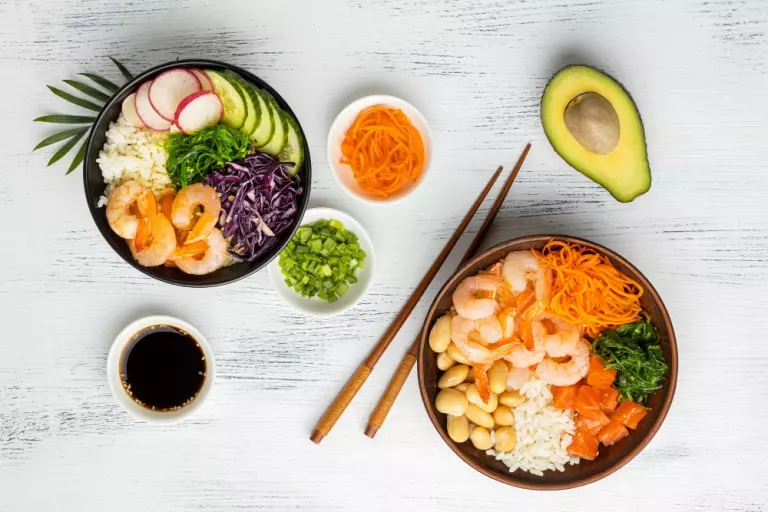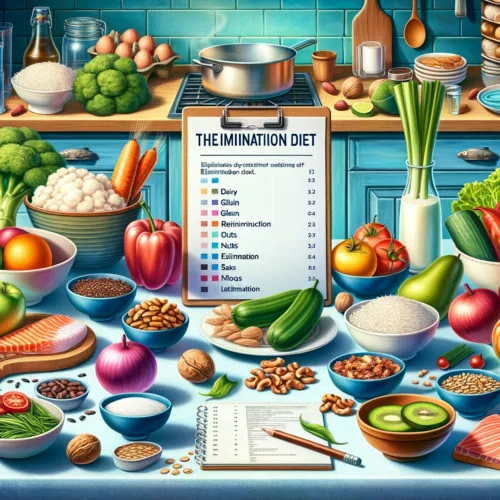The keto diet is a popular and unique approach to nutrition that was developed in Japan. It is based on the principles of traditional Japanese cuisine and focuses on balance and food quality. In this article, we will look at who came up with the Keto Diet, what kind of people it will be good for, what foods can be consumed on this diet, and we will also offer a sample menu of foods for each day of the week. In conclusion, we will evaluate the pros and cons of this diet.
| Pros of the keto diet | Minuses of the keto diet |
|---|---|
| Effective weight loss | Strict carbohydrate restrictions, which can be difficult to adhere to. |
| Improvement in blood sugar levels | It is possible to develop ketoacidosis if the diet is not followed correctly. |
| Appetite suppression and satiety | Not recommended for people with certain kidney and liver diseases. |
| Increased energy level | It is possible to have a “keto flu” with symptoms such as fatigue and irritability. |
| Improved concentration and mental clarity | Can lead to deficiencies of important micronutrients and vitamins. |
| Suitable for some cases of epilepsy and neurological disorders | Can cause digestive problems and constipation. |
| May help in lowering triglyceride levels and raising “good” cholesterol levels | There may be problems with social adjustment due to limitations in food choices. |
History of the Keto Diet
The keto diet is named after one of Japan’s main cities, known for its ancient culture and traditional cuisine. The diet was developed by nutrition experts, including dietitians and food specialists, to offer a healthy and balanced approach to eating based on Japanese traditions.
Who the keto diet is suitable for
The keto diet is suitable for a wide range of people, especially those who are committed to a healthy lifestyle and want to control their weight. It can also be beneficial for people suffering from diabetes or cardiovascular disease due to its emphasis on low intake of saturated fat and sugar.
Recommended foods on the keto diet
– Fish and seafood: such as salmon, tuna, shrimp, which are rich in beneficial Omega-3 fatty acids.
– Fruits and vegetables: including pears, apples, broccoli, spinach and kale, which provide important vitamins, minerals and dietary fiber.
– Green tea: rich in antioxidants and health benefits.
– Useful grains: such as quinoa, buckwheat, and barley, which contain fiber, protein, and other nutrients.

Food menu for each day of the week
About the pros and cons of the keto diet
The keto diet offers many benefits for those seeking a healthy lifestyle. It is based on fresh and natural foods rich in nutrients, as well as the principles of moderation and balance.
Keto diet – pros
– Healthy Eating: The keto diet emphasizes fruits, vegetables, fish and grains, which are the foundation of a healthy diet and provide the body with essential vitamins, minerals and antioxidants.
– Moderation in Consumption: The diet involves moderate food consumption, which aids in weight control and prevents overeating.
– Low in saturated fat and sugar: The keto diet limits saturated fat and sugar intake, which has positive effects on the cardiovascular system and helps manage blood sugar levels.
Keto diet – cons
– Limitations: It may be difficult for some people to follow the strict rules of the diet, especially if they are used to a different type of diet.
– Not suitable for everyone: The keto diet may not be suitable for people with certain food restrictions, allergies or dietary requirements.






Conclusion
The keto diet is a unique approach to healthy living based on the principles of traditional Japanese cuisine. It is suitable for people seeking weight control and better overall health. The keto diet emphasizes fresh foods rich in nutrients and encourages moderate food intake. However, like any diet, it has its limitations and may not be suitable for everyone. Before starting the keto diet, it is recommended that you consult with a doctor or nutritionist to make sure it fits your individual needs and health.
So, the Keto Diet offers a unique and healthy way to live a lifestyle based on Japanese nutritional traditions. With appropriate menus and moderate consumption, you can achieve balance and weight control. If you are striving for a healthy lifestyle, consider incorporating the Keto Diet into your diet. Remember that everyone is different, so it is important to find the diet that works best for you.
Frequent questions
The keto diet, or ketogenic diet, is a high-fat, low-carbohydrate diet that promotes the body’s transition into a state of ketosis in which it uses fat instead of carbohydrates as its primary source of energy.
It is recommended to consume foods rich in fats such as olive oil, avocados, nuts, coconut oil, as well as proteins (meat, fish, eggs) and limited carbohydrates (e.g., low-carb vegetables).
A keto diet can help you lose weight, improve blood sugar levels, increase satiety, boost energy levels, and even support some neurological conditions such as epilepsy.
Yes, the keto diet can cause symptoms such as ketosis hunger as well as the need for vitamins and minerals. It may not be suitable for people with certain medical conditions, so a doctor should be consulted before starting.
The duration of following a keto diet can vary depending on your goals. Some people choose to follow the keto diet for a short period of time for quick weight loss, while others prefer to use it as a long-term lifestyle.
Yes, the keto diet can be beneficial for some athletes, such as long-distance runners, but its effectiveness can vary depending on the type of sport and individual needs.
Recommendations include controlling carbohydrate intake, ensuring adequate fat intake, following vitamin and mineral recommendations, and regular health monitoring and consultation with a doctor or nutritionist.













